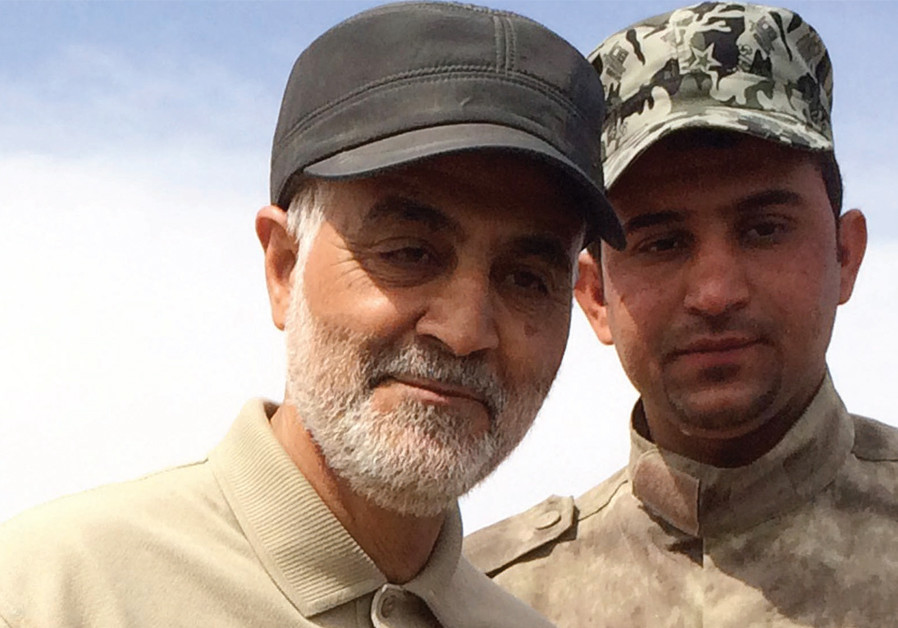
Iranian Revolutionary Guard Commander Qassem Soleimani (left) stands on the frontlines during an offensive operation against Islamic State in the town of Tal Ksaiba, in Iraq, in 2015. (photo credit: STRINGER/ REUTERS)
It must have hit Quds Force Commander Maj.-Gen. Qassem Soleimani in the gut: Another of his plans to attack Israel blown to smithereens by the IAF.
Soleimani ad been personally involved in this latest attempt to strike Israel with armed drones, likely motivated by the alleged IAF jets targeting Iran’s Islamic Revolutionary Guard Corps (IRGC) and their Shi’ite militias in broad daylight in Iraq.
Tehran even hinted that a response was forthcoming, with a commentator close to the IRGC writing in Iran’s Kayhan daily newspaper that IAF operations would lead to “surprises” including the launching of drones towards sensitive targets in Israel.Sounds familiar, no?
Last year an armed Iranian drone infiltrated into Israeli skies armed with explosives that had been launched to carry out a sabotage attack in the Jewish state. The advanced Iranian drone, believed to be a copy of a US stealth drone that was downed in Iran in 2011, took off from the T-4 airbase deep in the Syrian province of Homs and crossed into Israeli territory via Jordanian airspace.
The drone was intercepted near Beit She’an by an Apache attack helicopter.
Perhaps Soleimani learned his lesson from that failed attack and chose to strike Israel with Qasif type drones used by the Houthis in Yemen against Saudi Arabia.
But Israel’s intelligence community closely monitors events in Syria, especially movements by Iran, disrupting Soleimani’s plans.
While it was rare enough for the IDF to claim such an attack, as it usually prefers to allow for plausible deniability, the confirmation by Israel came moments after Syrian media reported that regime air defenses had been activated against “hostile enemy targets.”
It was all planned.
Taking to Twitter, Maj.-Gen. (res.) Amos Yadlin said that there are several possible reasons behind Israel’s decision to take responsibility: “1. Signal as warning to the enemy to avoid further escalation; 2. increases readiness of our forces for an Iranian response; and 3. serves political purposes by distracting from the deteriorating security situation in Gaza and the West Bank.”
According to Yadlin, there is “a wide, multi-dimensional (geographic, operational, intelligence, technological) campaign [being] waged in the Middle East, far beyond last night’s strike in Syria. This is an Israeli-Iranian conflict in Syria, Iraq, and Lebanon (and Yemen and [Saudi Arabia]?) with both significant Russian and American forces presence, and their discontent about the events. So far all remains under the threshold of war but a consistent escalation control is vital.”
This wide multi-dimensional campaign waged by Israel, known as “a war between wars,” is likely behind Iran’s attempt to attack the Jewish state as reports surfaced in recent weeks of the IAF striking Iranian positions in Iraq.
The United States even objected to Israel’s alleged strikes, leaking their discontent and details of the strikes to The New York Times.
But, while Israel was quick to say they were behind the explosions which rocked the Syrian skies, Iran on Sunday morning denied that anything had happened.
“This is a lie and not true... Israel and the United States do not have the power to attack Iran’s various centers, and our [military] advisory centers have not been harmed,” IRGC Maj.-Gen. Mohsen Rezaei was quoted by Iran’s ILNA.
Nevertheless, Hezbollah-affiliated Twitter accounts released pictures of two militants, Yasser Ahmad al-Dhaher and Youssef Zbeeb, killed in the strike. Another Iranian operative was said to have been killed, as well.
So Iran, tell the world nothing happened as your operatives are led to their final resting spot in Syria.
Around the same time early Saturday morning, across the border in Lebanon, Hezbollah reported that two Israeli drones – one of which was armed – crashed in Beirut causing damage to the group’s media office and injuring three people.
Israel hasn’t said a word about Lebanon, a country which it has refrained from attacking, and, according to experts, the drones which crashed in Beirut were Iranian and not Israeli.
That, Yadlin said, was the more interesting aspect of the IAF’s busy night in the north.
“Maybe a more interesting incident took place in Beirut last night,” he said on Twitter, adding “Were Iranian drones prevented from taking off from the Beirut area??? The strategy of the two sides appears to be ‘cooling’ the situation down to avoid full scale conflict.”
The escalation on the northern front comes three weeks ahead of the September 17 election. On Sunday morning, Hezbollah warned that it would respond to the deaths of its militants in Syria and the drones over Beirut at a time that suits the group.
Whenever, where ever, the two sides are inching closer to an all-out confrontation.
var cont = `Join Jerusalem Post Premium Plus now for just $5 and upgrade your experience with an ads-free website and exclusive content. Click here>>
`; document.getElementById("linkPremium").innerHTML = cont; (function (v, i){ });
https://www.jpost.com/International/An-angry-Qasem-Soleimani-wont-give-up-on-his-dream-to-attack-Israel-599649
2019-08-25 18:07:00Z
CAIiEKVbzDucHo6E6Pfl5co9EHMqGAgEKg8IACoHCAowr9eeCTDYlm4whdicAQ
Bagikan Berita Ini














0 Response to "Qassem Soleimani won’t give up on his dream to attack Israel - analysis - The Jerusalem Post"
Post a Comment